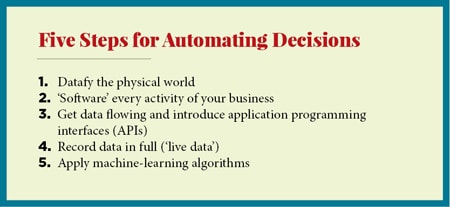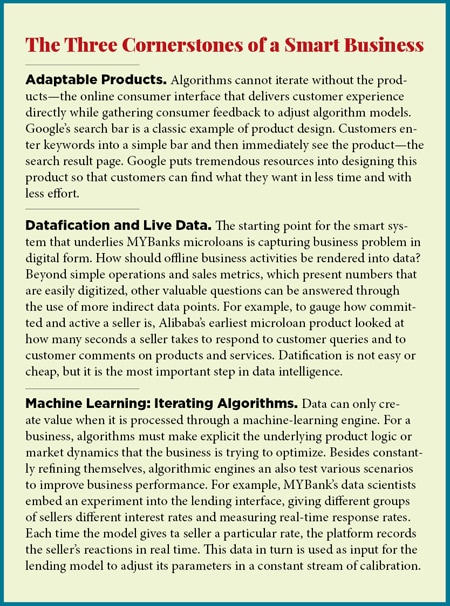
What it takes to be a 'smart business'
A digital business pioneer describes the keys to being a smart business
 Ming Zeng, Chief Strategist, Alibaba Group
Ming Zeng, Chief Strategist, Alibaba Group
Q. Why is it important that every Western businessperson understand Alibaba’s business model?
Because Alibaba’s business model provides key insights into the future of strategy. The sources of competitive advantage have shifted dramatically and businesses need a new strategic approach that fits into an era where networks and data dominate. For us, strategy is no longer about analysis and planning; it is a process of real-time experimentation and customer engagement. Going forward, a big challenge for leaders will be to delegate more and more work to machines—especially in routine operational decisions—so that people are freed up to become more creative and innovative.
Q. Is Alibaba China’s version of Amazon?
Definitely not. Alibaba first grabbed global attention with the biggest-ever initial public offering on September 19, 2014, and today, it has a market cap that is on par with Amazon; but that’s where the similarities end. Alibaba has a unique business model. We are not a retailer in the traditional sense. We don’t source or keep stock and logistics services are carried out by third-party providers. From the beginning, Alibaba has been an open ecosystem that empowers millions of sellers to do business on our platform. Alibaba is what you get if you take every function associated with retail and coordinate them online into a data-driven network of sellers, marketers, service providers, logistics companies and manufacturers.
We have succeeded in connecting and coordinating all of these players, relying heavily on machine learning technology to achieve scale and manage complexity. We basically do what Amazon, eBay, PayPal, Google, FedEx, all the wholesalers and a good portion of manufacturing in the U.S. does—with some elements of the financial sector thrown in. To a large degree, we have fostered the development of modern retailing in China, transforming it to the forefront of 21st century business models.
Many people still think of China as it was two decades ago: The world’s factory, undeveloped and filled with copycat businesses. This impression is a dangerous mistake. Chinese companies are creating world-class products and consumer experiences. China is now a virtually cashless society. Everything is paid for with the swipe of a smartphone. China is not just catching up anymore—it is innovating in parallel and even leapfrogging Western companies in some areas. The pressure is on for these companies to become ‘smart businesses’.
 Image: Shutterstock
Image: Shutterstock Q. How do you define a smart business?
Smart businesses use machine learning to gather data from their networks of participants to automatically respond to customer behaviour and preferences. A smart business allows the entire value chain to be reconfigured to achieve both scale and customization, using a combination of two forces: network coordination and data intelligence.
Network coordination is the breaking down of complicated business activity so that groups of people or firms can get it done more effectively. Functions that were once locked into vertically integrated structures or rigid supply chains are now easily coordinated through online connections. As the network of business actors coordinates online, business activities are also getting smarter: constantly flowing data, created from real-time interactions, creates a continuous feedback loop that automatically generates decisions that are increasingly ‘intelligent’.
Data intelligence is the business capability to effectively iterate products and services according to consumer activity and response, and it is a radical departure from how most firms generate products and services today. A simple example of data intelligence is recommendation engines; but the capability I am describing is much more sophisticated than that. Companies can now develop more highly evolved applications of data intelligence if they automate decision making and constantly run real-time data—say, supplier’s shipping times, fabricators’ finishing notices, logistics tracking or customer preferences. This automation is achieved through machine-learning algorithms that enhance coordination and optimize every link in the value chain.

Q. You believe automating decisions is a five-step process (see sidebar). Which is the toughest step for business people?
Every step is difficult because it requires a different mindset—a ‘smart business’ mindset. But if you push me, I think the most difficult part is the first step—‘datafying everything’. For the last 200 or 300 years in the industrial economy, we have been dealing with physical products and a physical environment; but now, you have to transform your business into a digital one, and that requires very deep knowledge of the domain of your industry and also, deep understanding of all the new technologies and ways of operating. For leaders in a traditional industry the challenge at hand is to understand and embrace this smart-business mindset.
Q. How is Alibaba using artificial intelligence?
Artificial intelligence is an example of what we call 'general technology', which means a technology that has so many applications it can be applied in almost any context. Of course, this process takes time. People need to develop the technology and find innovative ways to use it, and we are in that same process.
Take search, for example. Search is powered by early AI technology, but over the last five years, we have developed a great recommendation-engine capability. We can tailor make offers to anyone who visits our website, in real time. We’re also exploring automation in warehouses, logistics and deliveries. This includes robotics, self-driving tasks, smart warehouses and smart production facilities. All of these require artificial intelligence.
Data scientists are continually uncovering new ways to model problems and program machine-learning algorithms to make them more powerful. Most machine learning algorithms learn by processing huge amounts of data before they are unveiled to the public. Once the algorithm does a good job, a company can put it into operation in real time, with real customers. These algorithms continue to improve as they use the data stream gushing from online events like our 2017 Singles Day. On this one day, the Alibaba platform handled 325,000 transactions per second at its peak—the equivalent of 20 million transactions per minute.

Q. Talk a bit about your foray into financial services.
China has not had a sophisticated financial system, because banking has historically been a government function designed for large state-owned businesses and individual savers. Lending to small and medium-sized businesses (SMEs) was beyond the scope of most Chinese banks. In 2012, we saw this unmet need and realized that we had all the necessary ingredients to creating a high-functioning, scalable SME-lending business. Today, our microloan business is called MYBank, and it is a completely virtual bank with no offline locations.
The key to MYBank’s success is that our data scientists are able to compare groups of good borrowers with bad ones and isolate common traits from both groups, calculating a credit score for each client. What is revolutionary about our approach is that such comparisons are done by algorithms automatically on all borrowers using all of their behavioural data—at least thousands and sometimes hundreds of thousands of pieces of data—in real time. At the same time, the algorithms that calculate credit scores are themselves evolving in real time, improving the quality of decision making over time.
Q. Despite all of these advances, you believe that the individual is more powerful today than ever before. Why?
In the traditional economy, organizations operated like well-oiled machines, and a person’s place as a cog in the machine was more or less fixed. There was little room for development or change. Network technologies have changed all that. Large platforms prosper only because they enable individuals to grow and succeed. At the same time, individuals can increasingly access and utilize capabilities and other assets that they do not own themselves.
Overall, the principles of smart business apply to individuals just as they apply to firms. My advice for individuals is to be flexible: Think carefully about your positioning within an organization or network and explore how data technologies can maximize your contribution. Choose roles and partners that give you the most leverage and bring the greatest future potential. At the same time as advanced technologies appear to be taking over the world, they are coalescing to unleash individual creativity. They need not swallow the individual, but can instead propel you forward to greater heights.
Q. What is the greatest challenge on your plate at the moment?
Keeping up with the waves of innovation! We will see more and more exciting changes in the coming decades, and we are doing our best to keep up. That’s the key message of my book: Smart business is the emergent paradigm of the future, and it will likely become dominant in the next decade. Everyone has to understand the fundamental principles of operating in this environment and find their own way to survive.
Ming Zeng is Chief Strategy Officer and Chairman of the Academic Council at Alibaba Group. He is the author of Smart Business: What Alibaba’s Success Reveals About the Future of Strategy (Harvard Business Review Press, 2018) and co-author of Dragons at Your Door: How Chinese Cost Innovation is Disrupting Global Competition (HBR Press, 2007).
[This article has been reprinted, with permission, from Rotman Management, the magazine of the University of Toronto's Rotman School of Management]




